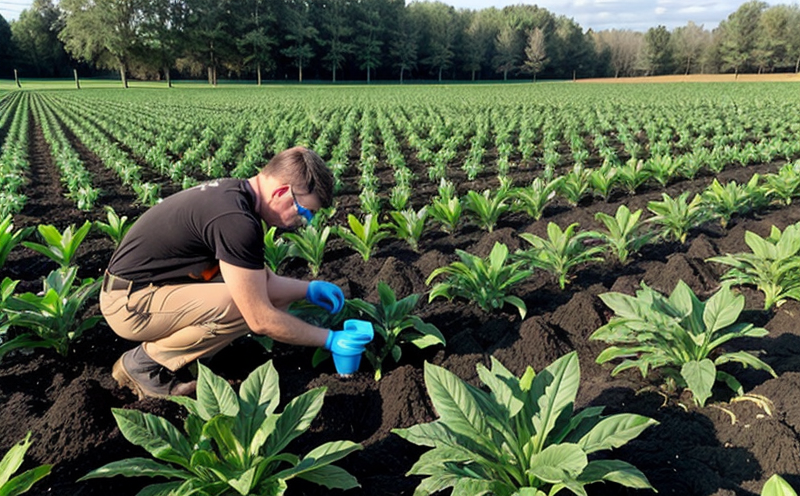Sulfate Sulfur Testing in Fertilizers
In agriculture and forestry testing, ensuring the purity and effectiveness of fertilizers is critical to achieving optimal crop yields. One essential parameter that must be meticulously monitored is sulfate sulfur content. Sulfate sulfur plays a pivotal role in plant metabolism as it aids in chlorophyll synthesis, enzyme activation, and nitrogen fixation processes.
When conducting sulfate sulfur testing on fertilizers, the aim is to determine the percentage of sulfur present in the form of sulfates (SO₄²⁻). This type of sulfur is highly bioavailable and readily utilized by plants. The methodology for this test involves a combination of sample preparation, digestion, and analysis using standardized techniques such as those outlined in ISO 11467:2013.
Sample preparation typically includes dissolving the fertilizer sample with an appropriate acid medium to facilitate complete digestion of the complex compounds. The digested solution is then analyzed for sulfate content through various analytical methods including colorimetric assays or ion chromatography, both widely recognized by international standards like ASTM D4201 and EN 1735.
Understanding the significance of sulfate sulfur in fertilizers allows quality managers to ensure that products meet strict regulatory requirements. Compliance officers can rely on accurate test results to avoid non-compliance issues with local or international regulations governing fertilizer composition. R&D engineers benefit from precise sulfate content data as they refine formulations aimed at enhancing plant health and growth.
For procurement teams, knowing the sulfate sulfur levels is crucial when sourcing raw materials for fertilizer production. Ensuring consistent quality across batches helps maintain product reliability throughout the supply chain. In summary, accurate sulfate sulfur testing ensures that fertilizers perform optimally, promoting sustainable agricultural practices and supporting environmental stewardship.
Why It Matters
The importance of sulfate sulfur in fertilizers cannot be overstated. Sulfur is a macronutrient essential for plant growth and development, contributing to the structure of proteins and enzymes within plants. Inadequate levels of sulfate sulfur can lead to deficiencies that impede photosynthesis and nitrogen fixation processes, ultimately affecting crop yields and quality.
Compliance with international standards such as ISO 17240 ensures that fertilizers meet stringent requirements set by regulatory bodies worldwide. Non-compliant products not only risk rejection but also potential damage to brand reputation and consumer trust. By conducting thorough sulfate sulfur testing, stakeholders can mitigate these risks while ensuring product integrity.
From an ecological perspective, accurate sulfate content measurement helps minimize environmental impact. Over-fertilization due to incorrect formulations could lead to nutrient runoff into water bodies, causing eutrophication. Proper sulfate monitoring allows for calibrated application rates that support sustainable farming practices and protect natural ecosystems.
Benefits
- Enhanced Crop Performance: Accurate sulfate content ensures optimal plant health, leading to improved yield and quality.
- Regulatory Compliance: Adherence to international standards prevents non-compliance issues and associated penalties.
- Sustainable Practices: Proper sulfate monitoring supports environmentally friendly agricultural methods by minimizing waste and runoff.
- Consistent Quality: Reliable test results enable consistent product performance across batches, enhancing brand reputation.
International Acceptance and Recognition
The global agricultural industry relies on standardized testing procedures to ensure uniformity and reliability of products. ISO standards such as ISO 17240 serve as benchmarks for sulfur content determination in fertilizers, ensuring that tests conducted anywhere in the world adhere to consistent protocols.
ASTM D4201 provides additional guidance for analytical methods used in sulfate sulfur testing, aligning with international practices. Compliance with these standards is crucial for manufacturers aiming to export products internationally, as many countries require certifications based on recognized testing procedures.
The use of advanced instrumentation like ion chromatographs ensures precision and accuracy, which are paramount for acceptance by regulatory bodies globally. Laboratories accredited according to ISO/IEC 17025:2017 offer the highest level of confidence in test results, further enhancing international recognition.





